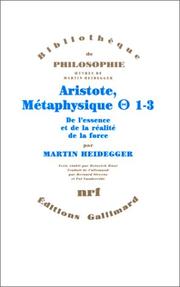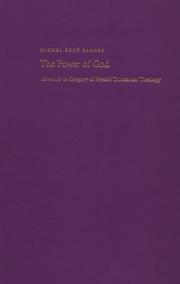| Listing 1 - 9 of 9 |
Sort by
|
Book
ISBN: 3826700228 Year: 2002 Publisher: Frankfurt am Main Hänsel-Hohenhausen
Abstract | Keywords | Export | Availability | Bookmark
 Loading...
Loading...Choose an application
- Reference Manager
- EndNote
- RefWorks (Direct export to RefWorks)
Act (Philosophy) --- Dynamis (The Greek word) --- Possibility --- Power (Philosophy) --- Aristotle.
Book
ISBN: 9783788733285 3788733284 Year: 2018 Publisher: Göttingen Vandenhoeck & Ruprecht
Abstract | Keywords | Export | Availability | Bookmark
 Loading...
Loading...Choose an application
- Reference Manager
- EndNote
- RefWorks (Direct export to RefWorks)
Greek language, Biblical --- Dynamis (The Greek word) --- Soteria (The Greek word) --- Semantics --- Terms and phrases
Book
ISBN: 9783111322520 3111322521 Year: 2024 Publisher: Berlin ; Boston : De Gruyter,
Abstract | Keywords | Export | Availability | Bookmark
 Loading...
Loading...Choose an application
- Reference Manager
- EndNote
- RefWorks (Direct export to RefWorks)
Das Buch von Julia Weber zeigt, auf welche Weise das von Aristoteles herrührende Verständnis von virtuellen Kräften als real nicht nachweisbaren, aber dennoch wirksamen Kräften den philosophischen Diskurs bis in die Moderne geprägt hat. Es verfolgt die Entwicklungen von den philosophischen Diskussionen um die Existenz von virtuellen Kräften in der Antike und im Mittelalter über das Aufkommen von virtuellen Räumen in der Frühen Neuzeit bis hin zur Entstehung von virtuellen Welten in der Literatur des 18. Jahrhunderts und macht auf diese Weise die bisher kaum nachvollzogenen Kontinuitäten und Verschiebungen zwischen antiken philosophischen Kraftdiskussionen und zeitgenössischen virtual realities sichtbar. Julia Weber’s book demonstrates how Aristotle’s understanding of virtual forces as undetectable but nonetheless effective has shaped philosophical discourse up until the modern age. It traces developments from philosophical debate about the existence of virtual forces in antiquity and the Middle Ages to the emergence of virtual spaces in the early modern period, and the appearance of virtual worlds in 18th-century literature. In this way, it reveals the seldom traced continuities and shifts between ancient philosophical discussion of forces and contemporary virtual realities.
LITERARY CRITICISM / Comparative Literature. --- 18th century. --- Aristotle. --- Early Modern Period. --- Literary Studies. --- René Descartes. --- aesthetics. --- dynamis. --- force. --- virtuality.

ISBN: 2070722899 9782070722891 Year: 1991 Volume: cours 1931 Publisher: Paris Gallimard
Abstract | Keywords | Export | Availability | Bookmark
 Loading...
Loading...Choose an application
- Reference Manager
- EndNote
- RefWorks (Direct export to RefWorks)
Ce cours de 1931 constitue un texte charnière dans l'évolution de la lecture heideggerienne d'Aristote, à mi-chemin entre les études des années 1920, liées au projet d'une ontologie fondamentale, et le séminaire de 1941 sur la notion aristotélicienne de phusis.Reprenant inlassablement la tentative de déterminer le sens unitaire de l'être - «Si l'étant est dit dans une signification multiple, quelle est alors la signification directrice et fondamentale ? Que veut dire être ?» -, Heidegger n'explore plus ici le dire de l'étant selon le vrai, comme à l'époque de l'ontologie fondamentale, mais bien : le dire selon dunamis et energeia. Il ne s'agit plus de montrer comment le Dasein lui-même, par son existentialité (et notamment par son propre dire apophantique), est le mode privilégié de l'être en tant que dé-couvrement. Il s'agit de s'orienter vers une pensée de la phusis en tant qu'elle est déterminée par le mouvement, le changement, ou encore : la venue à la présence. Le cours de 1931, en tâchant de cerner la notion de dunamis et en soulignant, de manière provisoire, sa définition comme «point de départ pour un changement», montre comment Aristote, loin d'avaliser la compréhension ousiologique de l'être, permet en fait de la dépasser en direction d'une saisie plus originaire de ce qui fonde toute temporalité.Mais, par-delà ces considérations sur la nature du changement, ce qui se profile ici discrètement c'est une détermination plus serrée de l'unité indéfectible être et parole.
Philosophy, Ancient --- Metaphysics --- Ontology --- Physis (The Greek word) --- Dynamis (The Greek word) --- Philosophie ancienne --- Métaphysique --- Ontologie --- Fusis (Le mot grec) --- Dynamis (Le mot grec) --- Aristotle. --- Aristotle --- Criticism and interpretation --- Critique et interprétation --- Métaphysique --- Critique et interprétation --- Criticism and interpretation. --- Metaphysics (Aristotle) --- Essentialism (Philosophy)
Book
ISBN: 9782711627653 2711627659 Year: 2018 Publisher: Paris Vrin
Abstract | Keywords | Export | Availability | Bookmark
 Loading...
Loading...Choose an application
- Reference Manager
- EndNote
- RefWorks (Direct export to RefWorks)
"Comment la notion aristotélicienne de puissance s'est-elle constituée ? Comment Aristote peut-il désigner du même nom de dynamis à la fois le principe du changement et l'être en puissance en tant qu'il est distingué de l'être en acte ? L'histoire de dynamis correspond-elle à l'effacement d'un sens primitivement intensif, qui serait celui de la force, au profit du sens aristotélicien de potentialité ? Plutôt que d'aborder ces questions dans les limites d'une lecture interne du Livre Thèta de la Métaphysique sur la puissance et l'acte, ou même du corpus aristotélicien, la présente recherche plonge d'abord la notion de puissance dans son histoire pré-aristotélicienne, philosophique et non-philosophique. Si les termes d'energeia et d'entelekheia, par lesquels Aristote désigne ce qui est en acte, sont des néologismes qui possèdent la précision du vocabulaire technique, le mot dynamis appartient au grec courant et comporte une polysémie qui complique la compréhension de son usage. Ce livre veut articuler les sens philosophiques de cette notion chez Aristote à partir de son histoire depuis Homère et Hésiode, à travers Démocrite, Xénophon ou encore le corpus hippocratique. Mais l'étude des principaux textes (poétiques, politiques, médicaux, mathématiques, philosophiques) est conduite selon un fil conducteur précis, dicté par l'emploi dominant de ce terme dans la clause restrictive kata dynamin ("autant que je le peux"). Les significations et l'histoire de dynamis sont réévaluées à partir de ce nouveau point de départ. L'héritage platonicien est aussi pris en compte pour dégager finalement le sens de la critique aristotélicienne de la puissance, qui met en lumière son indétermination axiologique et ontologique, sans renoncer aux sens de capacité et de force. Nous ne cherchons pas à proposer une étude lexicographique, mais à situer la pensée aristotélicienne de la puissance et de l'acte dans une histoire conceptuelle, en espérant qu'elle gagnera ainsi en cohérence et en clarté." Source : 4eme de couverture
Dynamis (The Greek word) --- Act (Philosophy) --- Power (Philosophy) --- Philosophy, Ancient. --- Aristotle. --- Plato --- Plato. --- Philosophy of nature --- Metaphysics --- Aristotle --- Possibility --- Force and energy --- Philosophy, Ancient --- Philosophy --- Possibility - Philosophy --- Force and energy - Philosophy
Book
ISBN: 8879610236 9788879610230 Year: 2000 Volume: 71 Publisher: Roma Institutum patristicum Augustinianum
Abstract | Keywords | Export | Availability | Bookmark
 Loading...
Loading...Choose an application
- Reference Manager
- EndNote
- RefWorks (Direct export to RefWorks)
Power (Christian theology) --- 296*332 --- Dynamis (The Greek word) --- Greek language --- Power (Theology) --- Christian sociology --- 296*332 Philo van Alexandrië:--studies --- Philo van Alexandrië:--studies --- Etymology --- Philo, --- Alexandria, --- Filon --- Filón, --- Filon, --- Filone, --- Philon, --- Philonis, --- Yedidyah, --- פילון --- פילון מאלכסנדריה --- פילון, --- פילון היהודי --- Филон Александрийский --- Filon Aleksandriĭskiĭ --- Pseudo-Philo

ISBN: 0813209293 9780813209296 Year: 2001 Publisher: Washington (D.C.): Catholic university of America press
Abstract | Keywords | Export | Availability | Bookmark
 Loading...
Loading...Choose an application
- Reference Manager
- EndNote
- RefWorks (Direct export to RefWorks)
Trinity --- Power (Christian theology) --- Dynamis (The Greek word) --- History of doctrines --- 231.01 --- 276 =75 GREGORIUS NYSSENUS --- -Power (Christian theology) --- -Dynamis (The Greek word) --- Greek language --- Power (Theology) --- Christian sociology --- Theology, Doctrinal --- Triads (Philosophy) --- Appropriation (Christian theology) --- God (Christianity) --- Godhead (Mormon theology) --- Holy Spirit --- Trinities --- Tritheism --- Drieëenheid. Drievuldigheid --- Griekse patrologie--GREGORIUS NYSSENUS --- -History of doctrines --- -Etymology --- Gregory of Nyssa, Saint --- -Contributions in doctrine of the Trinity --- -Gregory of Nyssa, Saint --- 231.01 Drieëenheid. Drievuldigheid --- Etymology --- Gregory, --- Ghirīghūriyūs, --- Grégoire, --- Gregor, --- Gregori, --- Gregorio, --- Grēgorios, --- Gregorius, --- Grigoli, --- Grigoriĭ, --- Grzegorz, --- Qiddīs Ghirīghūriyūs Usquf Nīṣṣ, --- Grigorije, --- Trinité --- Pouvoir (Théologie chrétienne) --- Dunamis (Le mot grec) --- Enseignement patristique --- Gregorius Nyssenus --- Gregor von Nyssa --- Gregorio di Nissa --- Gregorius van Nyssa --- Gregory of Nyssa --- Grégoire de Nysse

ISBN: 0813218527 9780813218526 0813209293 9780813209296 Year: 2001 Publisher: Washington, D.C. Catholic University of America Press
Abstract | Keywords | Export | Availability | Bookmark
 Loading...
Loading...Choose an application
- Reference Manager
- EndNote
- RefWorks (Direct export to RefWorks)
Dynamis (The Greek word) --- Power (Christian theology) --- Trinity --- Greek language --- Power (Theology) --- Christian sociology --- History of doctrines --- Etymology --- Gregory, --- Ghirīghūriyūs, --- Grégoire, --- Gregor, --- Gregori, --- Gregorio, --- Grēgorios, --- Gregorius, --- Grigoli, --- Grigoriĭ, --- Grzegorz, --- Qiddīs Ghirīghūriyūs Usquf Nīṣṣ, --- Grigorije, --- Gregorius Nyssenus --- Gregor von Nyssa --- Gregorio di Nissa --- Gregorius van Nyssa --- Gregory of Nyssa --- Grégoire de Nysse --- Trinity - History of doctrines - Early church, ca 30-600 --- Power (Christian theology) - History of doctrines - Early church, ca. 30-600.
Book
ISBN: 9783515129442 9783515129411 3515129448 Year: 2021 Publisher: Stuttgart : Franz Steiner Verlag,
Abstract | Keywords | Export | Availability | Bookmark
 Loading...
Loading...Choose an application
- Reference Manager
- EndNote
- RefWorks (Direct export to RefWorks)
Ethnicity is a social construct within an ideological framework, ancient or modern. This wisdom has penetrated most scholarly disciplines, but its reception is delayed in Black Sea studies, where essentialist views still prevail. Nationalism, Rostovtzeff's culture-history and Marxist-Leninist materialism have cast longer shadows on this part of the ancient world. Likewise, the balance between documentary sources and ancient literature needs redressing. The latter has often been either accepted in a positivist manner or rejected due to perceived inconsistencies. More rewarding is to try to understand what exactly the ancient authors knew or intended. In this light, the contributors discuss the concept of Sarmatization, the implications of rural versus urban cults, ethnic hierarchies, interaction patterns in colonial settings, inversions of barbarian stereotypes, cultural affiliations of Bosporan kings, imperial policies of Pharnakes I and II, foreign princes on the Ara Pacis Augustae, the reorganization of Pontos under Pompey and Deiotaros, the sanctuary of Leukothea in Kolchis, Christian urbanism in Scythia Minor and crop selections of Anatolian farmers. Though selective, the e-book covers the four coastlines of the Black Sea, ranging from the archaic to the Byzantine periods.
E-books --- Mer et civilisation. --- Politique et gouvernement --- Civilisation --- Géographie --- Mer Noire --- Histoire. --- (Produktform)Electronic book text --- Anacharsis --- Ara Pacis Augustae (procession friezes) --- Aspurgos --- Augustus --- Bosporan Kingdom --- Colchis --- Greek colonialism --- Heinz Heinen --- Hellenization --- Herodotos --- Herodotus --- Histria --- Kolchis --- Leukothea in Kolchis --- Marcus Vipsanius Agrippa --- Marxist-Leninist materialism --- Michael Rostowzew --- Mikhail Rostovtzeff --- Mithradates VI Eupator --- Mithridates VI Eupator --- Mtsvane Kontskhi --- Olbia --- Pantikapaion --- Paphlagonia --- Peace of Apameia --- Persianism --- Pharnaces I of Pontos --- Pharnaces II of the Bosporos --- Pharnakes I of Pontos --- Pharnakes II of the Bosporos --- Phasis --- Pompeius Magnus --- Pompey Magnus --- Pontos --- Pontos Euxeinos --- Pontus --- Roman Empire --- Roman Imperialism --- Russian historiography --- Sarmatians --- Sarmatization --- Scyles --- Scythia Minor --- Scythians --- Skyles --- Strabo's Geography --- Tomis --- ancient Asia Minor --- ancient Black Sea --- ancient Christian urbanism --- ancient Iranians --- ancient climate change and crop selection --- ancient farming --- barbarian stereotypes --- cultural identity --- ethnic constructs --- ethnic hierarchies --- ethnic identity --- ethnicity --- historical geography --- king Deiotaros --- king Deiotarus --- maritime goddess --- noble barbarian --- queen Dynamis --- rural cults --- (VLB-WN)9553
| Listing 1 - 9 of 9 |
Sort by
|

 Search
Search Feedback
Feedback About UniCat
About UniCat  Help
Help News
News